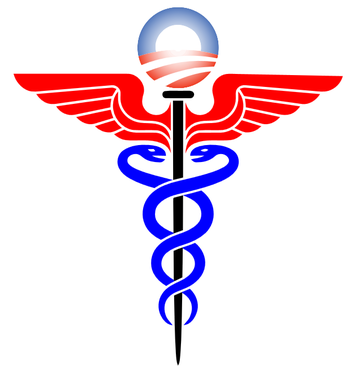Menu
Obamacare: A misstep in the right direction
|

Who had more to celebrate following the U.S. Supreme Court's ruling in King v. Burwell that the Affordable Care Act's health-care subsidies meet Constitutional muster, the Democrats or the Republicans? How about both?
Sure, some Republican stalwarts continue to call for the repeal of the ACA, but their deep-pockets backers are happy as clams that it is now the law of the land. Truthdig's Sonali Kolhatkar writes in a July 2, 2015, article that the most telling sentence in Chief Justice John Roberts' majority opinion is that "Congress passed the Affordable Care Act to improve health insurance markets, not to destroy them.” The Supreme Court didn't vote to improve access to healthcare, the six justices in the majority voted to "improve health insurance markets." Kolhatkar quotes Michael Moore, who wrote in a December 31, 2013, New York Times article that "Obamacare is awful." Moore also stated in the same article that "Obamacare is a godsend," and that it could lead to the ultimate goal of a single-payer healthcare system. (Vermont and California are among the states that have proposed or are expected to propose single-payer programs.) Following the decision, insurance stocks skyrocketed. David Goldhill and Paul Howard write in a Wall Street Journal article last updated on July 1, 2015, (subscription required) that ACA has created a new class of underinsured people who choose high-deductible healthcare plans. The authors paint a rosy outlook for the healthcare industry as consumer spending jumps and profits soar. "Imagine the market for health care if the amount of money spent directly by patients doubled or tripled," they write. Employers love the ruling because it cements their place in the center of the healthcare decisions of their employees -- while potentially saving them a considerable amount of money. In a March 11, 2015, article, Forbes' Richard Eisenberg predicts the end of employer-provided health insurance, just as employer-sponsored pension plans went the way of the dodo bird. In its place will be what is called a "defined-contribution reimbursement system." In a typical scenario presented by Rick Lindquist and Paul Zane Pilzer, authors of the book "The End of Employer-Provided Health Insurance," your employer pays you a monthly health-insurance stipend of $500. You shop for your preferred health-insurance plan and pay for it with money from the stipend. Unlike group health insurance, the stipend is taxable income, although some insurance companies will offer plans that comply with federal tax laws, according to the book authors (who just happen to be owners of a health-insurance company). Ultimately, employers wind up paying less than they do currently for group health insurance, and their employees pay more for health care. This is a "solution"? |
